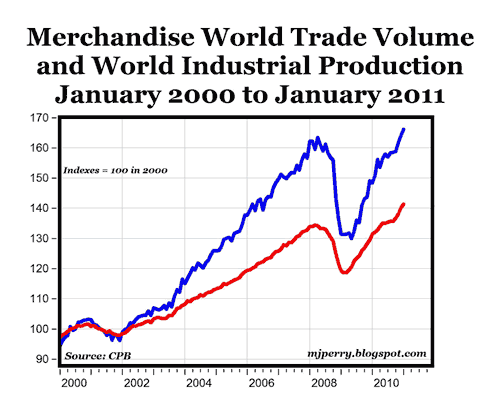
In post titled “Made on Earth,” Don Boudreaux links to a FT.com editorial “Manufacturing is All Over the Place,” here’s a key point:
“The challenge for economists is even more profound. In the old days, they typically measured the output of an economy by watching where goods were “made”; but which country should claim the “value” for an iPhone (or an Italian suit or an American Girl doll)? Where does the real “output” come, in a world where companies can shift profits around?
Indeed, such is the complexity that Pascal Lamy, the head of the World Trade Organisation, recently voiced the seemingly heretical idea that economists should stop paying so much attention to “import” and “export” statistics. Thus, instead of trying to measure what is now “made in America” – or “China” – what economists should do is focus on the global economy as a whole, he insists. “It no longer makes sense to think of trade in terms of ‘them’ and ‘us’,” he argues; 20th-century-style trade statistics can be too arbitrary in the 21st-century world.”
Don also links to Cato’s Dan Ikeson’s study “Made on Earth: How Global Economic Integration Renders Trade Policy Obsolete.”
With that background in mind, today’s report on world trade and world output from the CPB Netherlands Bureau for Economic Policy Analysis seemed especially timely. Here are some highlights:
1. World trade reached a new all-time high record level in January (index = 166.2), surpassing the previous record in December (164.1), which was the first month that world trade exceeded the pre-recession level of 163.5 in April of 2008 (see chart above).
2. World trade in January was 12% above its year-ago level, and marked the 13th consecutive month of double-digit annual growth starting in January of last year.
3. For the ninth straight month starting last May, world industrial output reached another new all-time record high level in January at 141.4. Compared to a year ago, world output has increased 7.6%, and is now 5.2% above the previous cyclical high of 134.4 in March 2008.
4. For almost two years, global output has increased in almost every month compared to the previous month, with only one month of output decline since March 2009.
MP: Based on the ongoing and solid improvements in both global trade and world output, especially the fact that both global production and trade are at an all-time historical highs, I think we can safely say that that the world economy has made a complete recovery from the global slowdown in 2008 and 2009. We can also now safely say that the global economy is in a new cycle of economic growth and expansion. To paraphrase Warren Buffet, “The world economy’s best days lie ahead.”
And as I have advocated before for the U.S., we should pay less attention to import and export trade statistics, and more attention to total trade volumes, and that should apply to both the U.S. and world economies.



Leave a Reply